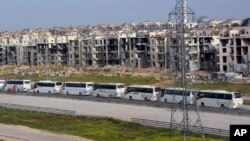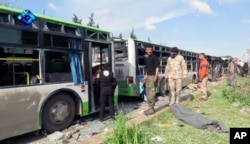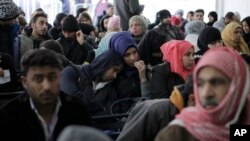Amnesty International says civilians in besieged areas of Syria are given no choice but to leave their homes under agreements reached between the country’s warring sides, and that thousands of forcibly displaced people now live under “dire conditions.”
In a report released Monday, the rights group said the Syrian government has increasingly relied on such deals as a strategy to force the opposition to surrender.
The Syrian conflict began in March 2011 with protests against President Bashar al-Assad’s government and grew into a civil war that has killed hundreds of thousands of people and led several million to leave their homes. Others stayed only to be held under siege by either government forces or rebel fighters.
In several cases in the past few years, the opposing sides have agreed to let people leave the besieged areas. The arrangements have included instances of coordinated movements of people from rebel-besieged areas into government-controlled territory, while those in towns besieged by pro-government forces took buses to rebel-held parts of Idlib province.
Amnesty said it looked at four agreements reached between August 2016 and March 2017 involving Daraya, eastern Aleppo, al-Waer, Madaya, Zabadani, Kefraya and Foua.
“In most instances this displacement was not carried out for civilians’ security or an imperative military necessity. That means it violated the prohibition of forced displacement under international humanitarian law, amounting to a war crime,” the report said.
Various rights groups have accused both Syrian government forces and opposition fighters of committing human rights abuses during the conflict.
The United Nations Security Council has issued resolutions urging the protection of civilians and the end of the sieges.
Amnesty said those messages are being ignored and said the U.N. should renew efforts to end unlawful attacks on populated areas, impose sanctions against those responsible for war crimes, impose an arms embargo on the Syrian government and to refer the situation in Syria to the International Criminal Court.
“All states should cooperate to bring an end to the dark stain on the world’s conscience that ongoing impunity for such crimes represents,” said Philip Luther, research and advocacy director for the Middle East at Amnesty.
The report also calls on the Syrian government to stop forced displacement of civilians and to ensure those who are displaced are allowed to return to their homes.







